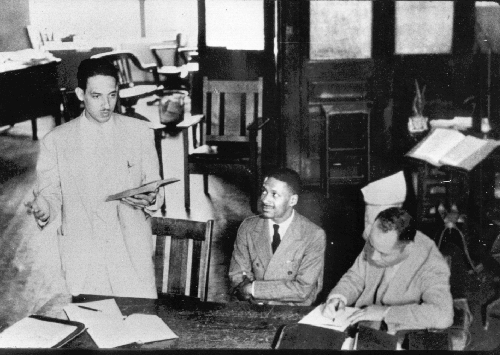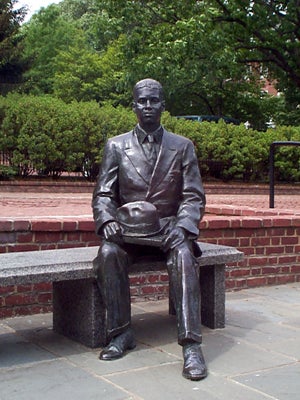
For social studies educator and activist Alana D. Murray ’98, Ph.D. ’12, Black history is American history—and family history.
Murray comes from a family of educators and trailblazers: from a grandfather who integrated the University of Maryland School of Law, to parents who broke new ground in higher education in the state, to the many educators in her extended family.
“Throughout my childhood, I was exposed to an understanding that education is a fundamental right for our democracy,” said Murray. “I’ve always balanced a deep interest in how African Americans fought for first-class citizenship in our country and a love for education.”

Murray’s grandfather, Donald Gaines Murray Sr., became the subject of a 1935 court case after his application to the University of Maryland School of Law in Baltimore was rejected due to his race. He was represented by legendary civil rights lawyers Thurgood Marshall and Charles Hamilton Houston, and his victory laid the groundwork for Brown v. Board of Education in 1954.
Her mother, educational psychologist Saundra Murray Nettles, was one of the first Black women on the faculty of UMD’s College of Education to receive tenure. Her father, community organizer Donald Gaines Murray Jr., was a founding member of what is now the Department of Africana Studies at the University of Maryland, Baltimore County. Both her grandmothers taught elementary school.
Although she initially resisted the idea of going into the family business of education and instead majored in government and politics at the University of Maryland, she fell in love with education as a rising college senior after spending a summer teaching through the Maryland Leadership Workshops program.
Now in her 27th year in Montgomery County Public Schools (MCPS), Murray has taught history and government in middle and high schools and served as a middle school principal. She now mentors principals as a director in the Office of School Support and Improvement and supports the next generation of teachers as an adjunct faculty member in UMD’s secondary social studies program and as a program co-coordinator for the Equity and Excellence in Education certificate program at McDaniel College.
“Dr. Murray believed in me from day one and continues to inspire me,” said Vassiliki Key ’11, a middle school social studies content specialist in MCPS, whom Murray mentored during Key’s teaching internship through UMD. “She modeled how to balance compassion with high expectations [and] because of her, I strive to truly see my students and mentees for who they are.”
Throughout her career, Murray has gotten students excited about history by including the stories of people from many backgrounds in her teaching. She said it’s crucial that they see themselves represented and learn about people who are different from themselves.
“When you teach a single story, you deny students a chance to see their full humanity,” said Murray. “When we teach a more accurate rendering of history, it becomes inspirational for students. We're providing our students with the skills to be active in our democracy and to own their own voice.”
Her desire to make an impact beyond her own classroom led her back to UMD to pursue her doctorate in curriculum and instruction. Today, as chair of the board of directors of the National Council for History Education, Murray supports its History’s Habits of Mind, an approach that encourages students to understand how the past shapes the present, read sources critically and learn about multiple perspectives as a foundation for active citizenship.
In addition, she has written a book on Black women’s contributions to social studies education and has developed an eighth-grade U.S. history curriculum for MCPS and lessons about Africa for History Alive from the Teachers' Curriculum Institute. Most recently, she worked with colleagues to publish the second edition of a resource guide for K-12 educators focusing on the roles everyday Americans, including young people, played in the civil rights movement, a topic that she says kids find particularly relevant.
“The closer it is to their experience, the more they can begin to connect with history,” she said.

Murray saw that happen on a field trip to Annapolis, where she and her students visited a statue of her grandfather outside the State House.
“I've always felt that it was important to teach students stories that gave them hope,” said Murray. “History is inspiring at its heart, and throughout history, in the face of oppression, people have found ways to fight back, ways to engage.”
Murray will be one of the featured speakers at the UMD College of Education’s Terrapin EdTalks from 5:30-8 p.m. April 9 at the Samuel Riggs IV Alumni Center.
This is one of a series of Maryland Today features during Black History Month celebrating Terp faculty, staff, students and alums.
Historical photo: From left, Thurgood Marshall, Donald Gaines Murray Sr. and Charles Hamilton Houston. Murray—grandfather of Alana Murray—desegregated the University of Maryland School of Law after winning the landmark 1935 civil rights case Murray v. Pearson, in which he was represented by the future Supreme Court justice. Courtesy of Maryland State Archives
Bottom photo: Donald Gaines Murray Sr. statue, part of the Thurgood Marshall Memorial Lawyers Mall, Annapolis. Courtesy Maryland State Archives



